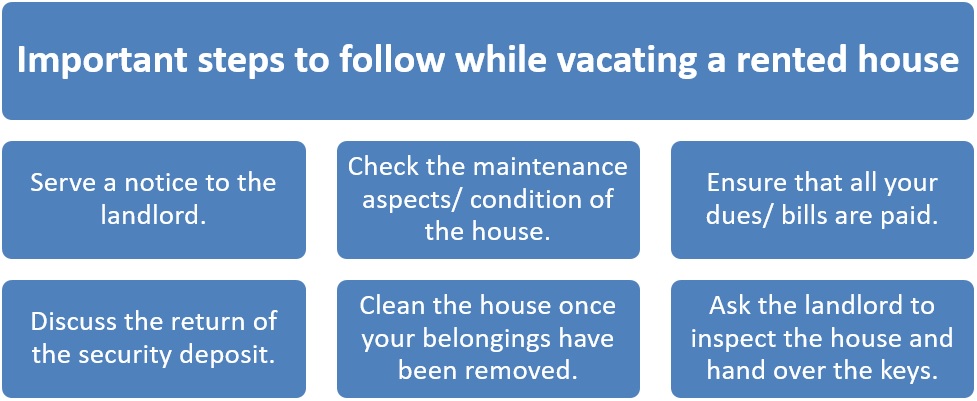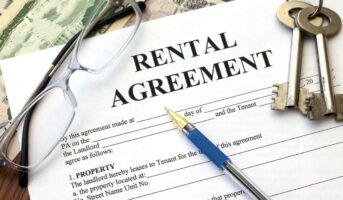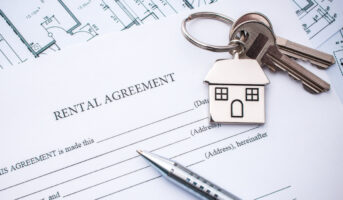Tenancy laws in India make it incumbent for a renter to follow certain protocols, once they decide to exit an apartment at the end of their tenancy period. Vacating a house in an unplanned manner, might not only lead to legal troubles but also monetary losses for the tenant. In this context, we look at the things that a tenant must do, while leaving a rental home.

Serve a notice to the landlord
As specified in the rental agreement, the tenant should serve a notice to the landlord, notifying the latter about his intention to vacate. The same is true, if the landlord desires to get his premises vacated. Since rental agreements in the residential sector typically talk about a one-month notice period, you have to let your landlord know one month in advance, about the planned exit. In case the notice period stated in your rental agreement is longer, you will have to serve the notice accordingly. If you are in a hurry to shift, because of any personal or professional reason, you may have to pay the rent for the entire notice period, as stated in the rent agreement.
All you want to know about rent receipt & its role in saving tax
Check the maintenance aspects in the agreement
An ideal rental agreement would also specify who is responsible for the various aspects of property maintenance. As a tenant, if you are entrusted with the job of maintaining certain facilities in your rented home, ensure they are in perfect condition when you leave. If that is not the case, the landlord will be within his rights, to deduct the expenses he would incur for rectifying the defects, from the security deposit. For example, if the apartment had proper piped water and electricity systems which became dysfunctional during your stay, you would ideally be liable to pay the landlord for the damages.
Under the provisions of the Draft Model Tenancy Act, 2019, the responsibility to maintain the premises lies with both parties. The rent agreement will have to specifically mention who takes care of what, in case of damages. Pay only for those damages, for which you are responsible.
Discuss the return of the security deposit with the landlord
According to the model law, landlords cannot ask their tenants to pay more than two months’ rent as security deposit, while signing the rental agreement. Unfortunately, tenants are forced to pay up to one year’s rent as security deposit in cities like Mumbai and Bengaluru, because the provisions of the model law are not binding on states and rental laws are state-specific.
If you have deposited a huge amount as the security deposit, you should talk to your landlord about the return of this amount. You should discuss the deductions that the landlord intends to make, because of the general wear and tear in his property over the course of your stay in the premises. Since the two of you might have varying notions about the expenses, it would require for you to reach an agreement and solve the matter peacefully. In case the expense exceeds the security deposit money, the landlord would also demand additional money from you. To ensure that a certain level of fairness is maintained, the tenant should ask for receipts for the expenses the landlord has paid for.
Pay all your other dues
Apart from paying whatever you owe to the landlord, ensure that you have paid for all other facilities you have been availing of, as the tenant. These include maintenance charges, water bills, electricity bills, etc. Ensure you have also made a full and final payment with your domestic help, cleaning services, washing services, neighbourhood grocery store, gym, etc.
Call the movers and packers
It would be better to leave the job of packing and moving your household items, to professionals, as the chances of damage to the household items will be high, if the packaging is not done as it should be. Moreover, cities have different policies on the movement of commercial vehicles with their peripheries. This means, you may not be able to move a truckload of your household items, at any point of the day. You may also have to obtain various permission for transporting your goods. Hence, it is more convenient to hire packers and movers, who better understand the whole process. You will also have to get in touch with your housing society, to get clarification on the moving policy. You may have to give the housing society staff an advance notice about the time when the packers and movers will come to the premises, to collect your belongings.
Also read our article on packing and moving tips.
Get the home cleaned
Besides being civil, you may also be legally bound by the provisions of the rent agreement, to get the premises cleaned once your stuff has been moved out of it. For this, you can hire service providers that do that task for you at affordable prices. Considering that several online players have forayed into the rental services business in India, you could simply pick one that suits all your needs. In fact, there are full-stack players in the market that would do the whole range of tasks for you.
The Housing Edge platform, for example, offers a variety of services that includes, online rent agreement, online payment of rent, packers and movers, rental furniture, home cleaning services, etc., at economical rates, for owners and tenants.

Show the house to the landlord
Once all your stuff has been moved and the house is cleaned, you should call your landlord for a final inspection of the apartment. This would ensure that s/he cannot complain about any problem at a later stage. It is also highly recommended that you click photos or make a video of the entire house, after the cleaning or repairs are done. This will not only act as documentary proof but also let the landlord have an idea about his property, in case he is not able to visit the premises, because of some limitations – a highly likely scenario during the ongoing Coronavirus pandemic situation.
Hand over the house keys
Once you are done with the shifting, hand over all the house keys to the landlord. In case you have been using your personal lock and key, you may take it along and ask the landlord to lock the apartment using his own.
Change your address in bank and government records
All your letters and other documents would arrive at this address, causing you and your former landlord great inconvenience, if you do not get your address changed in the government and bank records. This task should be completed, as soon as you shift to your new home.
FAQs
How much security deposit do tenants have to pay in India?
Under the provision of the Draft Model Tenancy Act, tenants have to pay not more than two months’ rent as the security deposit.
Will the landlord return the security deposit as it is?
In case there has been any general wear and tear or damages to the property, the landlord may deduct an amount close to the expenses required for making the repairs. In case the expense exceeds the security deposit, the landlord might demand more money from you.
What is Housing Edge?
Housing Edge is a full-stack rental services platform owned and operated by India’s leading real estate platform, Housing.com. With an aim to simplify the renting process, the company has launched a variety of products using which tenants, as well as landlords, can complete the formalities involved in the process without leaving the safety and security of their current locations.

An alumna of the Indian Institute of Mass Communication, Dhenkanal, Sunita Mishra brings over 16 years of expertise to the fields of legal matters, financial insights, and property market trends. Recognised for her ability to elucidate complex topics, her articles serve as a go-to resource for home buyers navigating intricate subjects. Through her extensive career, she has been associated with esteemed organisations like the Financial Express, Hindustan Times, Network18, All India Radio, and Business Standard.
In addition to her professional accomplishments, Sunita holds an MA degree in Sanskrit, with a specialisation in Indian Philosophy, from Delhi University. Outside of her work schedule, she likes to unwind by practising Yoga, and pursues her passion for travel.
[email protected]











